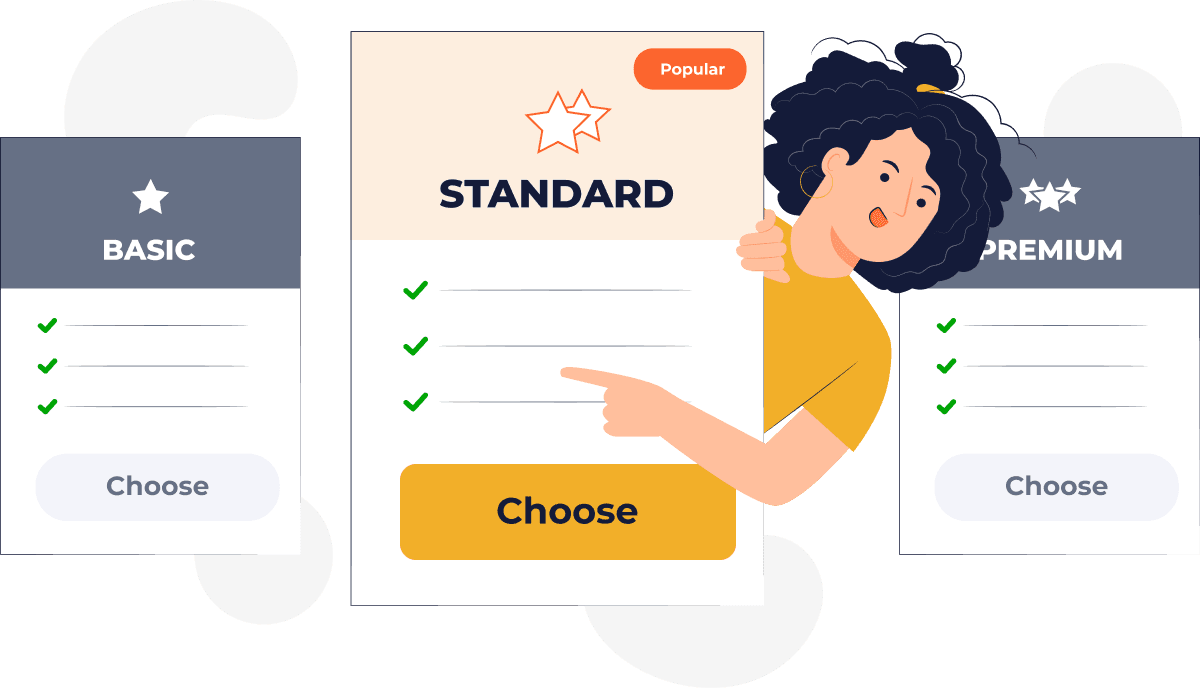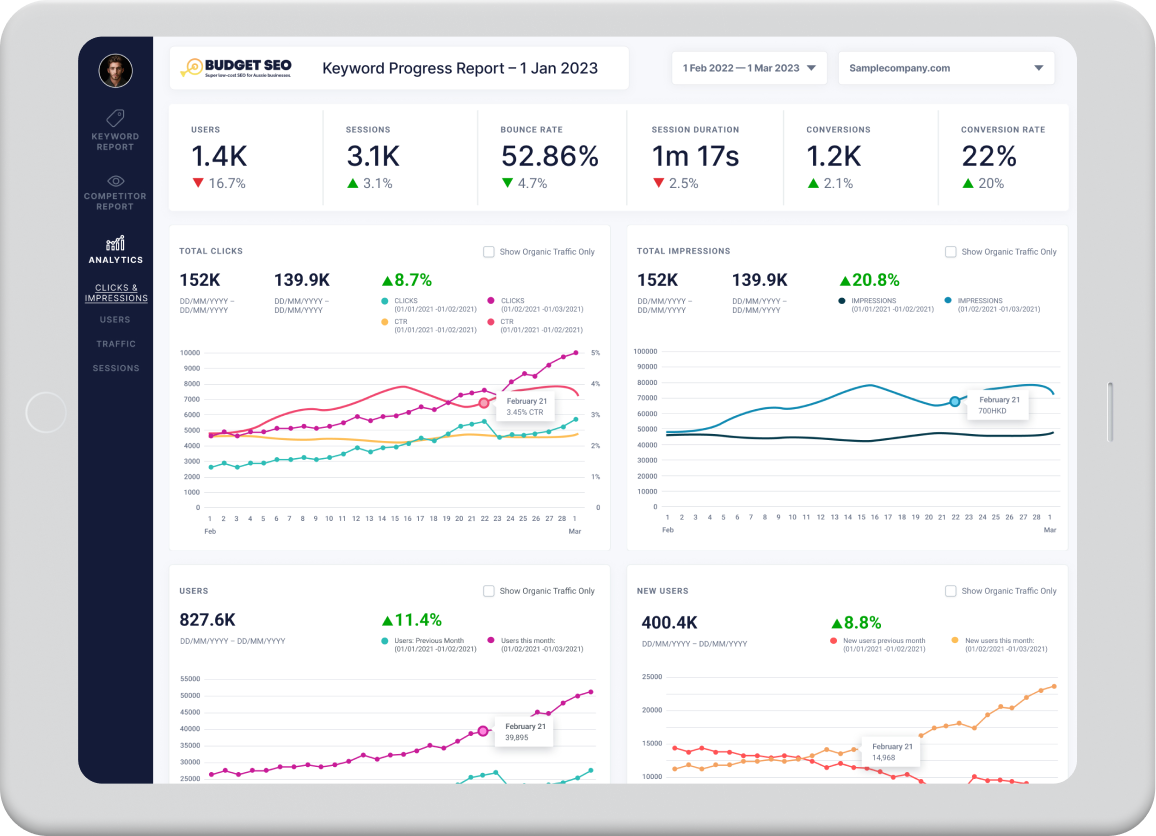

Our Action Plan.
Our powerhouse team is ready to catapult your business into the spotlight
and skyrocket your profits. Are you ready?


1. Pick your Power Pack
We’ve got a smorgasbord of affordable plans tailored to your budget and ambition. Your success story is just a choice away.


2. AI Website Scan and Kick-off
3. Keyword Gold Mining
4. SEO Power Audit
5. Execution
6. Link-building Launch
7. Real-time Tracking and Explosive Growth
New to our client portal?
Dive in with our video tour!
Our freshly launched portal is designed to keep things streamlined and transparent. Packed with easy-to-understand documentation and explainer videos for every service, we’ve got you covered. And if there’s something you can’t find or need clarity on, just drop us a line!

Claim your 100% free ‘DOMINATE GOOGLE'f
growth strategy session valued $1,800.
Hurry, limited spots available.
See some of our biggest claims to fame!

Generated over $3.8+ billion in sales for our clients

500+ Google Reviews globally with a 4.9/5 rating

Won 14 digital awards & counting
FAQs
Cant find your answer here? Get in touch →
What are the key steps of an effective SEO strategy?
An effective SEO strategy encompasses several key steps to achieve optimal results. The first step is conducting thorough keyword research to identify relevant and high-traffic keywords related to the business or website. This research helps in understanding user intent and enables the optimization of content accordingly. The next crucial step is on-page optimization, which involves optimizing meta tags, headings, URL structures, and incorporating targeted keywords naturally within the content.
Another important aspect of SEO strategy is creating high-quality and engaging content. This not only helps in attracting and retaining visitors but also encourages them to share the content, leading to increased visibility and potential backlinks. Content should be well-written, unique, and tailored to address the needs of the target audience.
Furthermore, building high-quality backlinks plays a significant role in SEO. Acquiring backlinks from authoritative and relevant websites demonstrates credibility and helps in improving organic rankings. Implementing a solid link building strategy involves outreach, guest posting, content promotion, and fostering relationships with industry influencers.
Why is SEO important for small businesses?
SEO (Search Engine Optimization) is highly important for small businesses due to several key reasons. Firstly, it enables small businesses to enhance their online visibility and organic search rankings, increasing their chances of attracting relevant and potential customers. This targeted approach ensures that their marketing efforts reach the right audience, leading to a higher return on investment and cost efficiency compared to traditional advertising methods. Additionally, by consistently appearing in search results, small businesses can build credibility, establish themselves as reputable sources, and foster customer trust and loyalty.
Moreover, SEO contributes to a positive user experience and website usability. Optimizing website structure, page load speed, and mobile responsiveness not only improves search engine rankings but also provides a seamless experience for visitors. This, in turn, leads to increased engagement, longer browsing sessions, and higher conversion rates. Finally, SEO allows small businesses to remain competitive in the digital landscape by leveling the playing field against larger enterprises. By implementing effective SEO strategies, small businesses can gain a strong online presence, attract targeted traffic, and grow their customer base efficiently.
What’s the point of backlinks?
Backlinks play a crucial role in search engine optimization (SEO) and serve multiple purposes. The primary point of backlinks is to establish credibility and authority for a website. When reputable and relevant websites link back to a particular site, it signals to search engines that the linked site is trustworthy and valuable. Search engines view backlinks as votes of confidence, indicating that other websites find the content or information on the linked site valuable enough to reference it.
Backlinks also contribute to improving organic search rankings. Search engines consider the quantity and quality of backlinks when determining the authority and relevance of a website. Websites with a strong backlink profile are more likely to rank higher in search engine results, leading to increased visibility and organic traffic.
What’s the difference between black-hat and white-hat SEO?
Black-hat and white-hat SEO are two contrasting approaches to search engine optimization, differing in their strategies, techniques, and adherence to search engine guidelines.
Black-hat SEO refers to practices that aim to manipulate search engine algorithms to achieve quick and often short-term gains in rankings, disregarding ethical guidelines. These tactics may include keyword stuffing, hidden text or links, cloaking, and the use of private blog networks (PBNs). Black-hat SEO focuses on exploiting loopholes in search engine algorithms without providing genuine value to users. While these techniques can yield temporary improvements in rankings, they carry a high risk of penalties or even getting banned by search engines, resulting in long-term damage to a website’s visibility and reputation.
On the other hand, white-hat SEO follows ethical guidelines and focuses on optimizing websites for users and search engines simultaneously. It involves creating high-quality, valuable content, conducting proper keyword research, optimizing meta tags and on-page elements, building genuine and authoritative backlinks, and improving user experience. White-hat SEO techniques prioritize long-term success, aiming to provide relevant and useful information to users, improve website credibility, and follow search engine guidelines. While white-hat SEO may take longer to see results, it builds a sustainable and reputable online presence while mitigating the risk of penalties.
How often will I receive updates on my website's SEO performance?
With the assistance of an internally owned CRM (Customer Relationship Management) platform that is capable of generating reports 24/7, you can have more frequent updates on your website’s SEO performance. This CRM platform can provide real-time data and insights on various SEO metrics, allowing you to monitor your website’s performance on a more regular basis.
Instead of relying on monthly or quarterly updates, the CRM platform empowers you to access reports and data whenever you need them. You can set up automated reporting within the CRM system to receive regular updates on key SEO metrics such as rankings, organic traffic, keyword performance, backlinks, and other relevant data points. These reports can be customized according to your preferences and requirements.
Having access to real-time or near real-time data through the CRM platform enables you to stay informed about the progress of your SEO campaign and make timely decisions. You can identify trends, spot any fluctuations, and take immediate actions to optimize your website’s performance based on the insights provided by the CRM reports.
How long will it take to see results after an SEO campaign?
The time it takes to see results from an SEO campaign can vary based on numerous factors, including the competitiveness of the industry, the current state of the website, the effectiveness of the implemented strategies, and the frequency of algorithm updates by search engines. Generally, it’s important to understand that SEO is a long-term strategy, and significant improvements may not happen overnight.
In most cases, it can take several months to start seeing noticeable results. During the initial stages of an SEO campaign, efforts are primarily focused on conducting website audits, optimizing on-page elements, and implementing technical improvements. These foundational tasks help search engines understand and index the website better. However, the impact on rankings and organic traffic may not be immediately apparent.
As the campaign progresses, with ongoing content creation, link building, and other optimization efforts, positive changes in rankings and organic traffic are typically observed. However, the time required to achieve substantial results can range from a few months to a year or more, depending on the factors mentioned earlier. It’s important to note that SEO is an ongoing process, and continuous monitoring, analysis, and adjustment of strategies are necessary to maintain and improve results over time.









